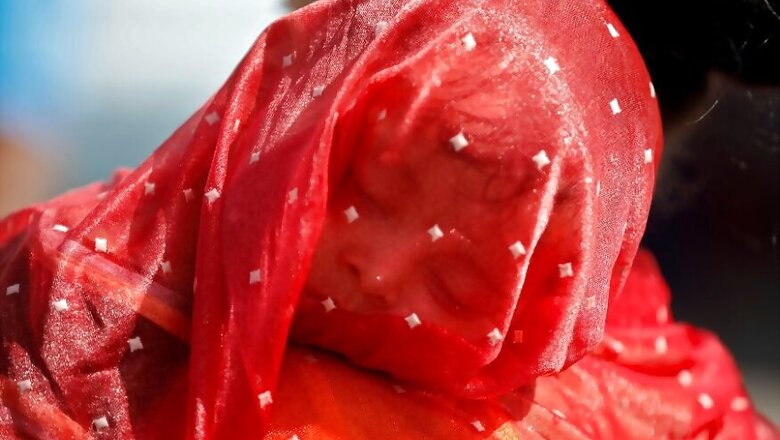
views
Sunita Majhi (name changed) wants to become a doctor. Her father Shyam Majhi believed in his daughter's dream and to fulfil that he sold most of his property to move to Visakhapatnam so that Sunita could study in a good school.
But after losing almost everything in the lockdown, Shyam has returned to his village in Odisha's Kalahandi district and has no plans to send 10-year-old Sunita to school at least for the next one year.
"The nearest school is 25 kilometre away. I don't have the means or the money to bear the cost of her education yet," Shyam, who worked as a driver in Visakhapatnam, told PTI over phone.
Child rights NGOs have expressed concern over migrant children dropping out due to closure of schools.
Priti Mahara, Director Policy, Research and Advocacy, Child Rights and You (CRY) said, "Since the first official national lockdown was announced, schools have been closed across the country. As migrant families return to their villages, struggling for their survival, it is very likely that their children's access to education will suffer unless special efforts are made."
"The recent traumatic experiences may affect their learning outcome and eventually affect their retention in school. School administration will need to provide special attention and counselling services to these children," she said.
Kamal Gaur, Deputy Director - Education at Save the Children, said COVID-19 has not just been a health emergency but also an education disaster.
"Studies suggest that on an average 20 per cent children dropout post emergencies, and the last 90 days lockdown has resulted in complete loss of education for these children who are moving with their migrant families," she said.
Working as a daily wage labourer at multiple construction sites of Greater Noida, Zorawar Singh (name changed) ensured that his two sons went to a respectable private school in Noida.
Singh moved back to his village in Rajasthan last week after spending nearly 12 years in Delhi when all his savings were exhausted. "I wanted my sons to become bada sahib and not end up like me. I tried my best," Singh said.
Singh now says he wants his sons to join the workforce and support the family."My sons are good in studies. One of them wants to become a teacher, while another aspires to become an IAS officer but right now the financial situation is such that I need more hands that could earn," Singh, whose sons are 15 and 14 years old, said.
For Raju Minz, the decision to move back to his village Dumka in Jharkhand from Delhi has been one of the toughest decisions of his life because of the education of his four daughters.
"I waited for two months thinking the situation would improve but it didn't. It just worsened. My wife and I did all odd jobs just to ensure that my daughters could continue their studies here. But now, all our savings have been exhausted and we will return," Minz said.
"And now my daughters would need to study at home at least for this year, there is no scope in the current situation to send them back to school," Minz whose daughters are 8, 10, 12, 13 years old said.
Priti Mahara suggested that the government schools should collect data of all migrant children from local administration and initiate an enrollment drive after lockdown.
"In the current scenario, even those who are receiving any kind of formal or non-formal education will face a lag. While the government has initiated several measures to enable continuity of education during lockdown through online means as well as initiatives using radio, community radio and television, special efforts would have to be made to ensure these children get access to these mediums of communication," she said.
They must also get access to special training or bridge courses to recover the loss in education and get enrolled into grades appropriate to their age into the mainstream education system once the lockdown is lifted up, she said.
She further recommended that the Right of Children to Free and Compulsory Education Act 2009 must be strictly implemented, which mandates local authorities to ensure admission of children of migrant families.
"Equally important is to start early childhood education and enroll children below 6 years in Anganwadi centers," she said. Gaur said education facilities are anyway hindered by pre-existing inequalities, lack of learning opportunities, homelessness, unemployed parents and sibling care when parents are exploring work opportunities.
"Moreover, current government programmes are Information and Communication Technology (ICT) based and children on the move cannot access it. While institutions are in place, the pandemic has disrupted access to education facilities and unsettled the system of education," she added.
The coronavirus-triggered lockdown has had a devastating impact on the economy as well as on the livelihoods of lakhs of migrant workers.
The plight of migrant workers, walking hundreds, sometimes thousands of kilometres, cycling or clambering onto buses and trains, to go from urban centres to their villages has been the focus of concern for almost two months.
The Centre has said around four crore migrant labourers are engaged in various jobs across the country. And so far, 75 lakh of them have returned home in trains and buses since the nationwide lockdown was imposed.

















Comments
0 comment